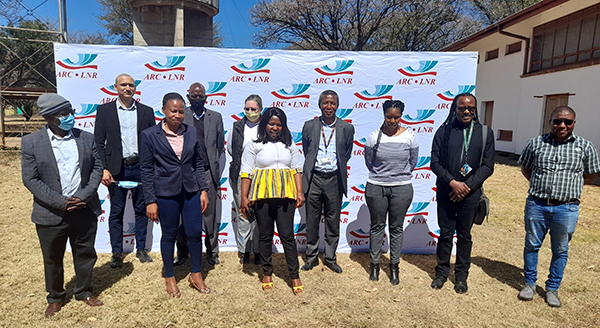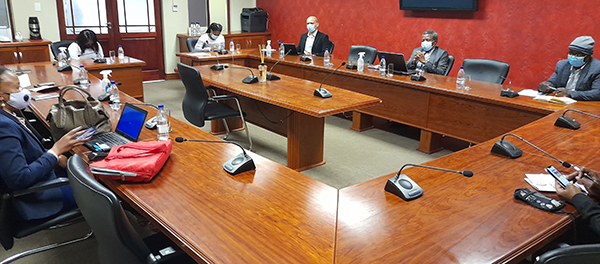
Equipped with state-of-the-art laboratories that provide students with hands-on experiences to bridge theory and practice
The morning of 31 August 2021 commenced with discussions at Unisa Rustenburg between the management of the College of Agriculture and Environmental Sciences (CAES) and Midlands management, collectively mapping the approach regarding the envisaged partnership and collaboration initiative with the Agricultural Research Council (ARC) and ORBIT TVET College.

Back, from left: Prof Llewellyn Leonard, School Director: Ecological and Human Sustainability; Prof Sogolo Lebelo, CAES Director: School of Agriculture and Life Sciences; Dr Van der Westhuizen, ARC researcher; Prof Solomon Magano, CAES Executive Dean; Dr Tracey Masebe, Acting Chair: Department: Life and Consumer Sciences; Prof Monde Ntwasa, CAES Acting Deputy Executive Dean; and Manda Nevhutanda, Facilities Manager: ARC.
Front, from left: Mbodi Khorombi, Unisa Midlands Head Facilitation of Learning; Kedibone Thantsha, Unisa Midlands: Manager Student Admin Services and Funding; and Prof Ntanganedzeni Olivia Mapholi, CAES Chair of the Department: Agriculture and Animal Health
In his introductory remarks, CAES Executive Dean, Prof Solomon Magano, stated that the Midlands region had a wide range of agricultural activities, making it imperative that CAES should explore and assess this market well and take full advantage of the available opportunities. "This can be attained through tapping into relevant industries that can yield positive results towards increasing our student market share," he said.
As a widespread region, Unisa Midlands does not only offer an opportunity to stimulate agricultural qualifications, but also provides a better platform to grow student numbers for other qualifications within CAES. "This can be achieved through maximising the level of partnerships and collaborations, such as the initiative that Midlands management has identified and spearheaded to ensure the dream becomes a reality through our concerted efforts," added Prof Monde Ntwasa, CAES Acting Deputy Executive Dean.
As he engaged the ARC management team, Magano referred to the state-of-the-art buildings and laboratories available at the Unisa Science Campus, and said that students utilise these daily for practical sessions and experimental purposes. He indicated that due to Unisa’s mode of teaching and learning, its students are spread across the length and breadth of the country, necessitating a need for partnerships with other relevant entities such as the ARC.
"The objective," said Magano, "is to bridge the gap to allow students who are within the proximity of these identified entities to gain access. Not only will students benefit immensely through utilising the high-value technologies available, thus eliminating the need to travel long distances to the Unisa Science Campus, but they will also be exposed to the research component, thus preparing them for their future research endeavour."

CAES management team with ORBIT TVET College management team discussing possible partnership and collaboration
The two parties engaged and explored several ways and methods on how to effectively work together for mutual benefit. They concurred that the current memorandum of understanding (MoU) in place with one of the ARC branches will need to be reviewed and revised with a view to broadening its scope through incorporating the latest aspects agreed upon, for the benefit of agriculture students in Rustenburg. One of the possibilities tabled was for the ARC to co-supervise some of the CAES postgraduate students, thus benefiting both parties, since ARC also needs students to supervise in research, while Unisa students benefit from obtaining a practical and work-integrated learning component.
ARC management and Unisa regional management finally reached consensus regarding the content of the MoU. Further engagements will follow, as will the rollout of the agreement between the two parties.
As he began the discussion, Magano indicated that in recent times, there has been a paradigm shift, causing the demand for higher certificate qualifications to sky-rocket, and creating a need for technical vocational education and training (TVET) college partnerships to come on board to provide much-needed assistance on teaching and learning. He added that the behavioural pattern of these students was different in the sense that they were normally students who emerged straight from matric and needed more guidance and attention to ensure that they complete their studies successfully. "This will lessen the burden on academics," he said, "enabling them to focus on their core mandate in providing adequate support towards formal and postgraduate qualifications."
During his welcome address, Dika Mokoena, ORBIT TVET College Principal, mentioned that ORBIT has campuses in Rustenburg, Mogwase and in Brits, and this initiative is highly appreciated as it has been part of their strategy to tap into partnerships of this nature. He added that what remained was to explore how they could map a way forward and ensure that the initiative becomes viable by ensuring that the MoU clearly outlines the role of the ORBIT TVET College. In conclusion, he pointed out that they would have to examine available capacity and resources to determine the extent of their involvement and assess the services they could manage to enlist from their end, although they would remain open for encompassing other services in due course, as and when the need arises.
Prof Sogolo Lebelo, CAES Director: School of Agricuture and Life Sciences, supported the move and mentioned that the focus would not only be on agricultural qualifications, but also others under CAES that may require practical sessions and a work-integrated learning component.
Magano concluded by expressing the hope that this initiative would bear fruit and set a trend in creating a model that can function optimally, encouraging other institutions countrywide to follow suit.
* By Winston Rampedi, Communication and Marketing Manager, Midlands Region
Publish date: 2021-09-08 00:00:00.0